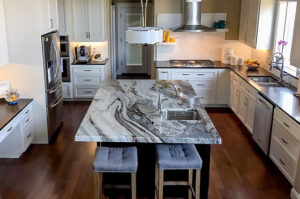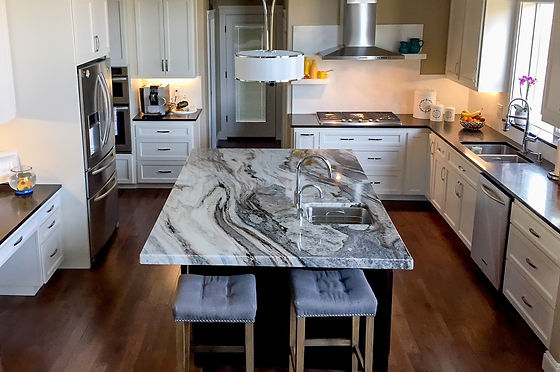If you’re looking for a beautiful, long-lasting countertop for your kitchen, consider Granite Countertops. Not only do these countertops provide a natural look, but they can also add significant value to your home. However, they are not cheap, so it’s important to consider your budget before making a decision. This article will cover the most common questions about granite countertops. Getting the right look is key, and granite countertops are not cheap, but they are worth the money.
 The best way to keep your granite countertops looking their best is to maintain them properly. A sealer is essential in preserving granite countertops. These materials are porous, so liquids and chemicals will eventually evaporate, or be absorbed by the stone. To speed up this process, use different poultices. This will help to prevent water and dirt from damaging the stone. If you’re unsure how to maintain your granite countertops, ask your fabricator for a recommendation.
The best way to keep your granite countertops looking their best is to maintain them properly. A sealer is essential in preserving granite countertops. These materials are porous, so liquids and chemicals will eventually evaporate, or be absorbed by the stone. To speed up this process, use different poultices. This will help to prevent water and dirt from damaging the stone. If you’re unsure how to maintain your granite countertops, ask your fabricator for a recommendation.
There is a low level of radiation that most granite countertops emit, but the emissions are insignificant compared to the background radiation originating from outer space and the earth’s crust. Despite this, radiation inspectors and concerned homeowners have contacted the Environmental Protection Agency, reporting elevated levels of radon in granite countertops. The results of their tests showed that the radon level in the kitchen countertop was 1.3 millirem per hour. Ultimately, the low-level emissions of granite countertops do pose a health risk, but they don’t necessarily mean that you can’t enjoy them.
Although quartz and granite countertops are similar in appearance, their qualities differ widely. Your decision will ultimately depend on your budget, personal preferences, and the type of project. Quartz slabs have made their way into the market, and home improvement stores are aggressively marketing these materials. Granite, on the other hand, is a natural stone. The process of mining begins by pulling out massive blocks of rock, which are then cut into slabs. These slabs are then polished to bring out their natural beauty.
The downside to granite countertops is the price. They are incredibly expensive, and you’ll need to have them sealed every year to minimize the growth of bacteria. Because they’re so expensive, it’s important to hire a professional to install them. In addition, granite countertops are difficult to repair, so you might need to hire a professional. So, before you decide to install your new granite countertop, remember to learn about its pros and cons.
Granite countertops have beautiful natural veins and are easy to clean, but they do require annual or periodic sealing to maintain their luster and color. The best way to protect your countertops is to avoid using highly acidic or alkaline cleaning products. In addition to avoiding acids, you can also consider applying stain protectants. While you might not need to seal your granite countertops, you can apply them to engineered quartz and other materials as well. A simple solution is to use a neutral pH cleaning solution, water, and a non-abrasive cloth.
A beveled edge is a more contemporary option for granite countertops. It creates a sleek, modern appearance. These edges are also easy to clean and don’t hold spills. A waterfall edge is also an excellent choice for contemporary designs. In general, beveled edges are the least expensive and easiest to clean. If you’re not sure what kind of edge to choose, consider the design of your kitchen before choosing a particular countertop.
Because granite is a natural stone, the price of a slab will vary. The cost per square foot will depend on the thickness of the slab and how many granite slabs you purchase. Common granite color is white and green. A distinctive color like red or blue may cost up to $200 per square foot. However, this will depend on your kitchen’s size and layout. Granite countertops are extremely durable and will last for decades. So you can’t go wrong with this beautiful countertop option.
If you want to keep your granite countertops looking beautiful, you should clean them regularly with a soft cloth. Avoid using over-the-counter polishes, because these can leave a residue that will collect dirt and stains over time. Moreover, avoid using acidic or abrasive cleaners on your granite countertops. As long as you use a non-abrasive cloth, you should be good to go. Remember, granite can withstand high temperatures, but extreme temperatures can damage the material.
The Lav Kitchen
Kitchen Design
